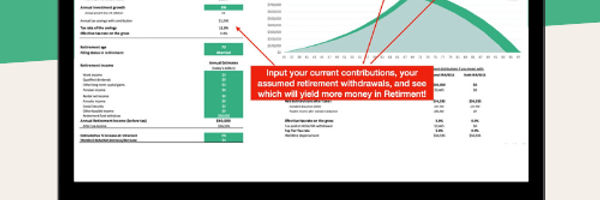If we had to summarize what retirement planning in your 30s is all about, it would probably go something like this: When you're in your 30s, you are in a unique position from a retirement planning standpoint. For most of us, these are the "make or break" years. Here's why.
It's certainly understandable how individuals in their 20s are too busy with distractions in their lives to think about retirement. It's so far away, and really not on their radar screen. But most 30-somethings have settled-down a bit. Those college years, and hopefully college loans, are far behind. Perhaps you're even married and have started a family.
The point here is that by the time you've reached age 35, most of us know exactly what we want out of life. We know where we want to live, and we have pretty solid ideas about our career goals. You've also been working for more than ten years, and have come to realize that retirement is not too far away. After all, those first ten years went by pretty quickly.
Unique Retirement Planning Opportunity
So what exactly is so special about being in your 30s when it comes to retirement planning? The unique opportunity you have is simply this: You have a good deal of financial experience, and you still have time to make retirement planning fun. Well, almost fun.
We're going to demonstrate this later on when we crunch through some numbers. But the fact of the matter is that you should have a good understanding of what it takes to make your monthly payments by now. With nearly 30 years to save for retirement, you still have time on your side. Retirement plans made after your 30s need to be much more aggressive then those made while you're still in your 30s.

Roth IRA or 401k? This template will answer your questions.
With this template, you will get:
All DFY, simply add your details
Charts for comparison and clear answer
Easily update for any year (2023, 2024, 2025, etc…)

Time and Retirement Planning
To demonstrate just how powerful time is, let's look at the following example. We'll pick the mid-range age of 35, and compare the necessary savings rate to that of a 55 year old. We did this calculation on our retirement savings calculator in case you want to run through some scenarios yourself.
Retirement Savings Example
Current Age | 35 | 55 |
Desired Retirement Age | 65 | 65 |
Annual Household Income | $60,000 | $80,000 |
Anticipated Income Growth Rate | 3.0% | 3.0% |
Desired Income Replacement Rate | 70% | 70% |
Current Retirement Assets | $4,000 | $4,000 |
Expected Return on Investments | 6.0% | 6.0% |
Expected Pension at Retirement | $33,000 | $33,000 |
Social Security at Retirement | $30,000 | $30,000 |
Ongoing Annual Savings Required | $5,359 | $10,125 |
In this particular example, the calculator tells us that your household income, if you're thinking about retiring at the age of 65, would be pretty close to $145,000 per year. You'd also like to make around $100,000 a year in retirement, which is roughly 70% of $145,000.
To meet that retirement income goal, you'd need to save just $5,359 per year, while a 55-year-old needs to save $10,125 per year just to make $75,000 a year in retirement. Keep in mind that the 55-year-old is only about 10 years away from retirement. In this example, they'd be making around $107,000 when they reach age 65.
If you don't like our example, then use one of our retirement calculators and run through the numbers yourself. There is no doubt that you'll come to the same conclusion. Saving for retirement now, makes things much less stressful on your pocketbook later on.
Saving for Retirement
We introduced a retirement planning guide in our article: Investing in Retirement Plans. That article walks the user through a series of questions to help them select the best approach to retirement saving.
Because time is still on your side, your savings strategy is still basically a two option approach: employee sponsored retirement plans, and individual retirement accounts.
Employee Sponsored Retirement Savings Plans
If you're employer offers you a pension plan, and if you believe that Social Security will still exist when you retire, which were the assumptions we used in our example, then you can probably fill 100% of your retirement income gap simply by participating in an employee sponsored retirement savings plan such as a 401(k) plan or a 403(b). You might also be offered the chance to participate in a Roth 401(k) or Roth 403(b).
That's right; retirement planning really could be that simple for individuals still in their 30s. With as many as 30 years to save, you don't need to set aside much money each year. In fact, many employers will match their employee contributions, making this an ideal way to save for retirement.
Individual Retirement Accounts
If your employer does not offer you a retirement savings plan, then your next option would be to open an individual retirement account such as a Roth IRA or a Traditional IRA. The current contribution limit for a Roth IRA is around $6,000 per year, which is right around the $5,300 retirement savings goal in our example. If you're married, then your spouse can open an IRA too.
Even if an IRA will not meet 100% of your retirement funding target, don't worry too much. If you're leveraging all the savings plans available, that's the best choice you can make right now. The important point here is to take that first step, and put money aside for the future.

Roth IRA or 401k? This template will answer your questions.
With this template, you will get:
All DFY, simply add your details
Charts for comparison and clear answer
Easily update for any year (2023, 2024, 2025, etc…)

Retirement Planning Strategies
If you're in your 30s, then there is a good chance you've been exposed to a systematic approach to solving a problem at work. Here the problem is creating a viable, long-term retirement strategy. Our recommendation is to take the "plan, do, check, and act" approach to solving your retirement planning problem:
Plan: Create a true retirement plan. Take your time and think about variables like the "ideal" retirement age. Think about questions and their answers such as: What other major expenses, such as paying for a wedding or paying for college, could throw your retirement plan off for several years? Use tools, such as retirement calculators, to figure out how much you need to save each year.
Do: You're done with the hard part, now all you have to do is to follow the plan. If your retirement plan calls for placing $4,000 into an IRA then, as the saying goes, just do it.
Check: After the plan has been in place for several years, you need to revisit that plan and ask yourself some slightly different questions. Were the original assumptions accurate? Is your salary growing faster or slower than planned? Is your retirement account balance growing as fast as you thought it would?
Act: If the old plan still applies to the current situation, then just keep going. Of course you need to check it again in a couple more years, but if it doesn't need fixing that's great. If you've found that you need to make adjustments, then simply incorporate them into a revised retirement plan.





